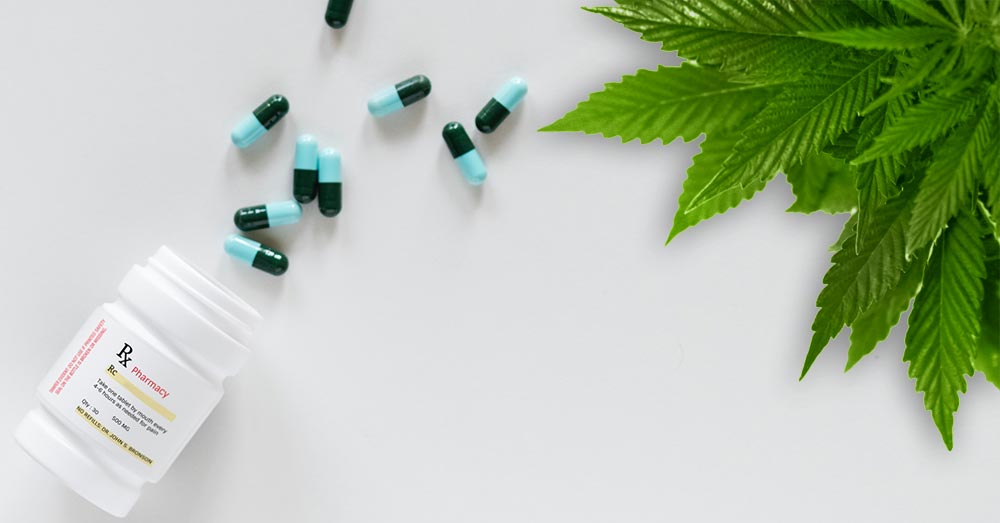 Shop
ShopBroad-Spectrum CBD Softgels
Broad-Spectrum CBD Oil Tincture
Full-Spectrum CBD Softgels
Full-Spectrum CBD Oil Tincture
CBD Gummies
CBD Balm
CBD Dog Treats
All Products >

CBD has become increasingly popular thanks to it's wide range of therapeutic uses, short list of side effects, and strong safety profile. It's range of benefits and non-intoxicating properties have seen CBD use grow and grow. A recent Gallup poll shows that 14% of Americans use CBD and only 35% of Americans are unaware of it altogether.
While generally safe, widely available, and widely used, CBD is a powerful and compound that can interact with medications and conditions. The concern is centered around how the body metabolizes CBD and other medications.
Before trying CBD, it's crucial to talk to your doctor. Here is a look at why this is such an important conversation to have.
When you consume a medication, your body has to metabolize it. Metabolizing is a process of breaking down the compounds you consume as they pass through the body, and the liver plays a big role here.
There is a family of enzymes called the cytochrome P450 (CYP450) system that is found within the liver. Within this system, there are more than 50 enzymes that process and eliminate toxins.
Some medications and substances affect CYP450 by either slowing down or speeding up drug metabolism. This change in the rate can alter how your body processes the medications you consume and creates a drug interaction.
Many compounds found in hemp oil are also processed by the P-450 system. For example, THC induces CYP1A2, reducing the levels of drugs metabolized by this enzyme. CBD inhibits CYP3A4 and CYP2D6, increasing the levels of drugs metabolized by these isoenzymes. (R)
CYP3A4 is an important enzyme that is responsible for metabolizing over 60% of pharmaceutical drugs available on the market today. When you consume CBD and inhibit CYP3A4, the enzyme can't work as effectively to break down other medications that you might consume. The opposite can be true as well, other medications can slow the processing of CBD.
This creates issues as medications are prescribed based on the healthy function of the P450 system. Inhibiting these enzymes can cause medications to process more slowly than expected, resulting in an increased concentration in your system that could exaggerate its effects, including unwanted or harmful side effects. Alternatively, speeding up how quickly the enzymes work can cause you to not have enough medication in your system when it's needed to treat an issue.

While all this talk of enzymes and metabolism is complex, these interactions are not uncommon. You may have been warned or seen warning labels about consuming certain medications with grapefruit or grapefruit juice.
This is because several of the compounds in grapefruit also inhibit the cytochrome P450 system just like CBD does. CBD, however, turns out to be a more potent inhibitor than compounds called furanocoumarins in grapefruit and closely related citrus'.
To make things easy, the grapefruit test is a great reference point for cannabidiol interactions. If your doctor has warned you about consuming grapefruit with any of your medications, it is a strong sign that you may see similar recommendations for CBD oil. Regardless of if you run into this warning or not, always check with your doctor before beginning CBD use.
As we mentioned above, the number of drugs processed by Cytochrome P450 is large. Luckily the Indiana University School of Medicine has produced a handy chart that outlines the drugs known to interact with this system. Here are some common categories of medications that carry a grapefruit warning:
If you're looking to try CBD yourself (or any new supplement for that matter) you must always consult your doctor about it first. They can help you determine if there is a safe schedule, appropriate product, and accurate dosage that is safe with your medications.
You may also wish to bring up the topic of topical CBD with your doctor as these products don't typically enter the bloodstream. Instead, these products bind to the cannabinoid receptors found in the skin. This may be an alternative to consuming products that do enter the bloodstream.